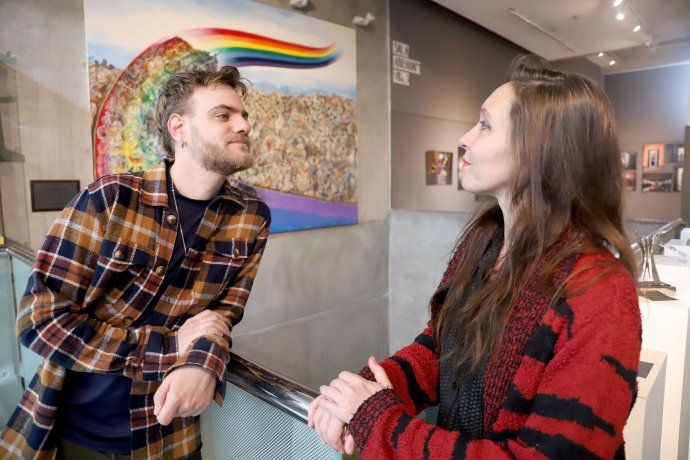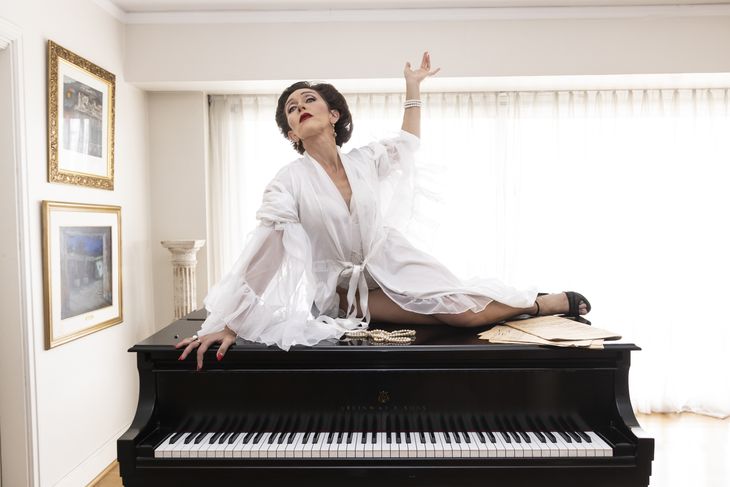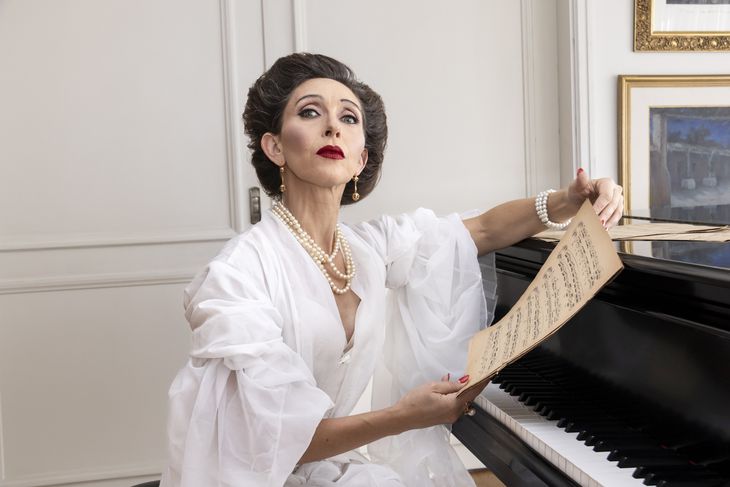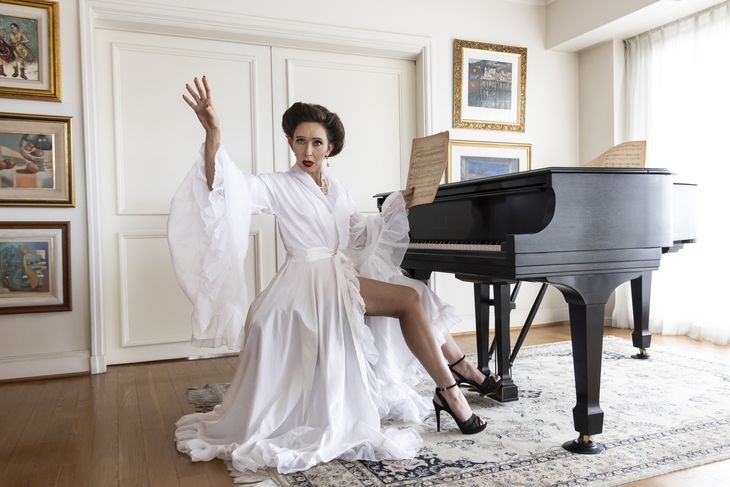“This work is current even though it is about a woman from the last century, because there is a force that wants to take us there again and it hurts to assume that a work like this can be current. Talking about those women allows us to rethink ourselves today,” says Raquel Ameri, who returns to the sole proprietorship with “Alma Mahler, symphony of life, art and seduction”, written by Victor Hugo Morales. The work that premieres tomorrow at the Cooperation Cultural Center, has Juan Ignacio López as a pianist on stage, also the author of the music that is played, in addition to that of Mahler, and the direction is by Pablo Gorlero.
Based on real events, the show traces the story of Alma, a composer who, persecuted by Nazism, could not be the inspiring muse of geniuses such as Mahler, Klimt, Kokoschka, Zemlinsky and many more. It can be seen every Thursday at 8pm. We talk with its protagonists.
Journalist: What is it like to do this one-man show after “Rota”?
Raquel Ameri: We did over a hundred shows and I gained some training so there is something familiar about being alone on stage. Acting is similar to a risky sport, I like the adrenaline of starting the work and knowing that I am like a tightrope walker, I enjoy that danger. Rota and this are different in poetics, aesthetics, scenic device, but for the performer it is that solitude with a lot of responsibility. I am not totally alone but with Juan, who is not a sound cushion but a presence that is used in the story, he acquires the entity of a character at times. Alma Mahler found a man to accompany her on stage. Both sole proprietors have two women who unfold their story, who encounter a society that asks them for explanations in relation to how they have played their role. The two characters bear the blame, they are attacked, swept away, ignored, but when it comes to holding them responsible they are the first. Both women lost children and that loads the guilt and responsibility. There is something about the struggle, the feminine, raising our voices, making visible how oppressed we have been.
FR__0062.jpg
Q.: Juan, what attracts you to the story of Mahler and his wife?
Juan Ignacio López: I was always a very deep admirer of Gustav Mahler’s work. He is a very important character in the history of music, especially for the period of which he was a part. He represented, along with other references, the end of romanticism, and in his work he took that expression to its limits. Alma is a character I knew, but I discovered her in the process of this work.
Q: What can you say about Alma Mahler?
RA: She had to find freedom in an oppressive context for women. The work talks about love at a time when we were on a path of deconstruction of romantic love. I am from a hinge generation, we do not conceive love as it was before but we have not yet managed to construct an idea of love in which we can feel safe. That’s why there is a lot of loneliness. I feel that the works do not reach me because yes, this work challenged me regarding my idea of love, it shows me that I can love a man again after being violated. In Rota I put wounds to play and here Alma loved those men, she wonders if it was love, admiration or survival. At the side of a man she was able to access places that she would not have been able to. The work brought me the idealized nature of love, how Alma allowed herself to love, desire, and talk about femininity. Her way of doing politics and transforming her had to do with her permission to her pleasure, which until today is taboo. She wanted to update the character and not make it a museum piece. Just as she was disturbed in her time, we can resonate today. I found a video of the singer Mon Laferte feeling a lot of pleasure and that’s why she was very criticized and attacked. We grew up watching movies about war and massacres, that is naturalized and accepted, but when the woman bursts in feeling pleasure, it makes us as uncomfortable as in those years.
Raquel Ameri Juan Ignacio López Work Alma Mahler

Ignacio Petunchi
Q: Who was Mahler for music? And for you?
JIL: A reference in musical expression. In his music we see the end of the system that was used until the beginning of the 20th century. Mahler constructed a work that constantly tensions and keeps the viewer always alert of what is about to happen. He was, for me, a master in orchestral discourse, in composition using the entire sonic spectrum of symphonic power. Personally, he is one, and perhaps the one who manages to move me the most when listening to him. He was meticulous in his writing and that accounts for his great knowledge of the orchestral format. But I find it truly remarkable how he constructed such an expressive and sensitive language with writing.
Q: What is the complicity with the musician on stage like?
RA: In the creative process another work is written, it is woven between text by Victor Hugo, with what we produce as artists. In that process I write my score of images, physical tone, musicality of saying, emotions, states, reasons. The score for an actor actress has to be as exact as a score for musicians. Every time I do the work I want to perform it with the precision of the musician when reading the score. It is a pleasure to have a musician to build that score together. This work is a great concert and I manipulate scores that belonged to my grandmother, who in 1945 played the piano. My grandmothers are present in this work, which also speaks of our ancestors and legacy. They survived in a context where machismo was naturalized. I honor them in her struggle, when I manipulate her scores I remember her, her who lives today at 93 years old. And I wear my other grandmother’s earrings, she was a poet but she couldn’t show her art. She wanted to dance and they didn’t let her, they forced her to play the piano. The work allows us to embrace the women who came before us.
FR__0197.jpg

Q: What did you propose when composing the music?
JIL: It was certainly a process in which, as a team, we discovered what type of material was needed to build the work. The process was based on getting to know Raquel, understanding a little of her virtues, and seeing what of that sensitive instrument could be manifested through music. This happens in a song as well as in the incidental behavior that music has. This proposal of the work is always present in which the music “is happening in her head”, she evokes it. But in the creative act I believe that this evocation is on the one hand Alma, but on the other it is also Raquel.
Q: What complicity is created between the musician and the actress on stage?
JIL: I believe that complicity is a delivery of sensitivity, in the sense of being permeable and actively listening. The music accompanies the text, but also the movement. It is notable when an actress, like in this case Raquel, shows herself with absolute dedication to the sensory flow of theater, of acting, being affected by what sounds or does not sound, accompanying a moment where music encourages her to grow in her expression. , or to reduce levels. It is not easy to find performers who are really absorbing this in the performative event, and who have the ability to build together from there.
FR__0292.jpg

Source: Ambito
I am an author and journalist who has worked in the entertainment industry for over a decade. I currently work as a news editor at a major news website, and my focus is on covering the latest trends in entertainment. I also write occasional pieces for other outlets, and have authored two books about the entertainment industry.




